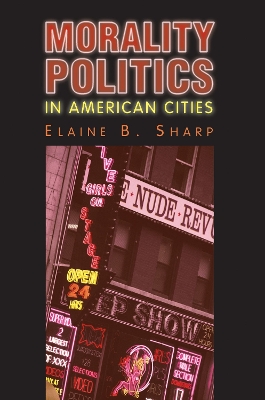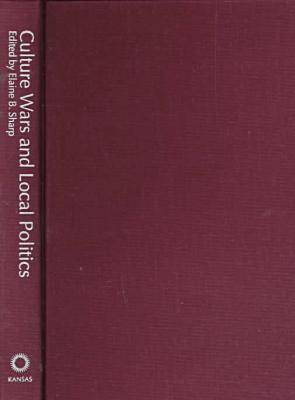Studies in Government and Public Policy
2 total works
Topless bars, casino gambling, needle exchange programs for drug addicts—theres no question, morality issues remain front and center in urban politics.
Presenting a systematic analysis of culture-war issues at the local level, Elaine Sharp shows how American cities deal with these ongoing concerns. Drawing on a sample of ten strategically chosen cities, she explains differences in how municipalities respond to controversies surrounding sex business, abortion clinics, legalized gambling, gay rights, and drug use. By analyzing the relative importance of subculture, economics, and institutional arrangements in the disputes, she points the way toward richer and more complete understanding of how different cities respond differently to these hot-button issues.
Far more than a statistical study, Morality Politics in American Cities is a collection of fascinating stories of real people grappling with down-to-earth issues and real-life drama—richly informative case studies that will captivate students and interested citizens alike. Mayors, public health directors, activists, and others speak their minds about the pros and cons of these controversies. Here are officials in one city confronting the Vatican over funding for abortion services, those in another battling a local university over its refusal to provide health benefits to gay partners of faculty members, and still others mounting a massive, community-sponsored attack on topless clubs.
These stories provide detailed evidence to support classifications needed for comparing cities experience with each of the five morality issues. They also corroborate inferences drawn from the comparisons by showing what considerations were in play as local officials grappled with these issues. Overall, the study shows that cultural factors usually dominate policymaking in local politics—except when specific economic interests are at stake—and also observes that county-level governments are more important than previously thought in terms of morality-issue decisions.
As provocative as it is informative, Morality Politics in American Cities demonstrates that such issues—same-sex marriage, for example—are multidimensional and often difficult to resolve. Its conclusions, however contingent, mark an important step in the ongoing process of understanding important differences in approaches to these issues and clearly show how moral conflicts continue to define American politics.
Presenting a systematic analysis of culture-war issues at the local level, Elaine Sharp shows how American cities deal with these ongoing concerns. Drawing on a sample of ten strategically chosen cities, she explains differences in how municipalities respond to controversies surrounding sex business, abortion clinics, legalized gambling, gay rights, and drug use. By analyzing the relative importance of subculture, economics, and institutional arrangements in the disputes, she points the way toward richer and more complete understanding of how different cities respond differently to these hot-button issues.
Far more than a statistical study, Morality Politics in American Cities is a collection of fascinating stories of real people grappling with down-to-earth issues and real-life drama—richly informative case studies that will captivate students and interested citizens alike. Mayors, public health directors, activists, and others speak their minds about the pros and cons of these controversies. Here are officials in one city confronting the Vatican over funding for abortion services, those in another battling a local university over its refusal to provide health benefits to gay partners of faculty members, and still others mounting a massive, community-sponsored attack on topless clubs.
These stories provide detailed evidence to support classifications needed for comparing cities experience with each of the five morality issues. They also corroborate inferences drawn from the comparisons by showing what considerations were in play as local officials grappled with these issues. Overall, the study shows that cultural factors usually dominate policymaking in local politics—except when specific economic interests are at stake—and also observes that county-level governments are more important than previously thought in terms of morality-issue decisions.
As provocative as it is informative, Morality Politics in American Cities demonstrates that such issues—same-sex marriage, for example—are multidimensional and often difficult to resolve. Its conclusions, however contingent, mark an important step in the ongoing process of understanding important differences in approaches to these issues and clearly show how moral conflicts continue to define American politics.
"Culture wars" have turned American communities into ideological battlegrounds. When issues like gay rights, needle exchange programs, abortion clinic protests, and hate crime are at stake, the response of citizens is likely to be strong -- and that of local governments is likely to be unpredictable.This collection provides alternative explanations of local actions with a focus on current conflict. A team of prominent scholars in urban politics examines how local governments handle morality-based issues: whether they evade controversies or instigate them, enact policies responsive to activist pressure or repress protests calling for change.Culture Wars and Local Politics features examples of actual experiences in selected cities, differing in community culture and size, from New York to San Francisco, Denver to Greenville, South Carolina. The contributors examine how the responses of local government to specific issues are influenced by such factors as political culture and institutions, belief systems of public officials, and a city's niche in intergovernmental relations or national social movements.Because culture wars represent more than just politics-as-usual, most theory related to urban politics doesn't necessarily apply. Departing from typical economic approaches to urban problems, this collection develops a perspective that draws on cultural analysis, the new institutionalism, feminism, social movement theory, and regime theory. It breaks new ground by challenging the comprehensiveness of existing treatments of urban politics, with each of the chapters contributing to a theoretical synthesis.How local governments handle these volatile issues has major implicationsfor civil liberties, preventing violence and the development or erosion of public trust. By providing a multi-topical approach focused at the local level, this book offers an excellent source for triggering both student discussion and citizen awareness.

